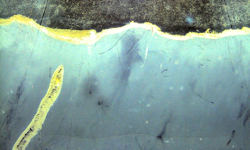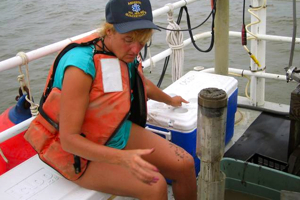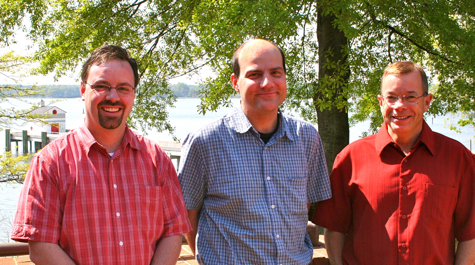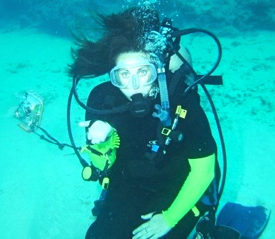Members of the Coastal Hydrodynamics and Sediment Dynamics lab at VIMS. From L: Professor Carl Friedrichs; Adjunct Professor Paul Panetta of ARA Inc.; and graduate students Lindsey Kraatz, Kelsey Fall, and Grace Cartwright.
Photo by Susan Stein.
By David Malmquist
Researchers at the Virginia Institute of Marine Science are involved in a unique public-private collaboration that could transform the way scientists look at—and into—the seafloor.
Sediments that erode easily can lead to dispersal of marine pollutants—many of which tend to accumulate in seafloor muds. Eroded sediments can also cloud the water, keeping sunlight from seagrasses and other marine plants. Shading of seagrass beds reduces their ability to shelter and nourish the young of blue crabs and other marine animals.
Sonar units detect and image objects by emitting sound waves and recording any resulting echoes. High-frequency sound waves, like those used to create the sonograms so familiar to expectant parents, provide extremely fine detail but don't penetrate very far into the materials being imaged. Low-frequency sound waves, like those used in oil exploration, exhibit the opposite behavior—they provide only rough details, but can penetrate through miles of rock or water.
Imaging the top few inches of the seafloor requires an instrument that operates between these extremes—with enough power to penetrate water and sediments, and enough detail to discern the subtle differences in grain size that define small-scale layering.
 The top few centimeters of seafloor sediments play an important role in marine ecosystems. Wormcam photo courtesy of Dr. Bob Diaz.
The top few centimeters of seafloor sediments play an important role in marine ecosystems. Wormcam photo courtesy of Dr. Bob Diaz.Although some sonar units used in marine research use frequencies appropriate to these criteria, they are typically designed for such specific purposes that modifying them to peer within the seafloor is difficult at best. An example is the Acoustic Doppler Velocimeter. ADVs can measure the speed (and direction) of underwater currents to the nearest 0.1 centimeter per second—but are not designed to take advantage of other acoustic information, such as backscatter and attenuation, contained within the reverberating sound waves.
Panetta has thus pursued a hybrid approach, taking a part that is generic to most marine sonar units (the "transducer" that sends and receives the ultrasonic pulse), and fitting it to a high-tech instrument normally used to test for cracks and corrosion in gas pipelines and other metal structures.
He says the instrument—a high-power ultrasonic pulser/receiver—is much more adaptable than a typical off-the-shelf sonar unit. "It opens the door to all sorts of post-processing and analysis of the signal, for frequency, amplitude, and time," says Panetta.
Panetta says the difference between using an ADV and the modified ultrasonic pulser/receiver to look at sediment is like the difference between "driving down the street and recording house numbers—103, 105, 107—or driving down the same street but stopping to look inside each house."
"The ADV gives you a single number that is used to determine the current velocity and the concentration of sediment in the water column," says Panetta. "The ultrasonic pulser/receiver gives you the raw ultrasonic signal and lets you examine all the background information, including—we hope—the grain size and structure in the top 5 to 10 centimeters of seafloor sediments."
That would be good news for Friedrichs, Cartwright, and Kraatz, who look forward to adding to their understanding of how sediments behave, both in the water and on the bottom.
"So far, we've only been able to look at what's in suspension," says Cartwright. "Now we're hoping we can combine what Paul knows and the data from his new instrument to also look at the top few centimeters of the bed."
The team plans to continue testing their instrumentation in the laboratory and field during the coming months. Panetta estimates that their research could make it into the marketplace within the next few years.
Excerpted from: http://www.vims.edu/newsandevents/topstories/archives/2010/sonic_partnership.php
Excerpted from: http://www.vims.edu/newsandevents/topstories/archives/2010/sonic_partnership.php






 Carl Friedrichs
Carl Friedrichs